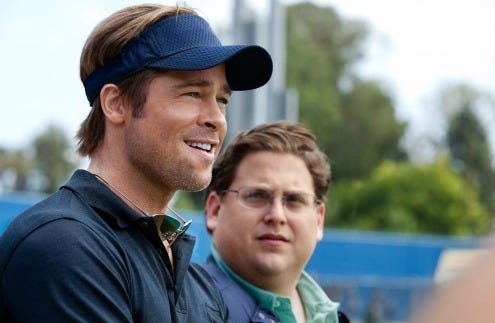Moneyball

“Moneyball” is simultaneously deeper and funnier than I thought it would be. Based on the nonfiction book by Michael Lewis, it’s a look at how number-crunchers have changed the game of baseball through something called sabermetrics. Instead of relying on gut instincts and baseball acumen to evaluate players, this method employs computers and bean counting to identify the best players that can be had for the least amount of money.
Now, baseball is not my thing. And mathematical algorithms are even less my thing. But instead of zeroing in on the technical aspects of sabermetrics, “Moneyball” is the story of Billy Beane. The General Manager of the cash-poor Oakland Athletics, Billy must try every year to put together a roster that can compete against teams like the New York Yankees, which can spend three times as much on payroll.
It’s a terrific performance by Brad Pitt, quite possibly the best of his career. His Billy Beane constantly operates on two levels: the brash, confident side he presents to his employees, the media and even his family; and the dark and brooding side that expects failure at every turn, refusing to even attend his own team’s games because he’s convinced he’s jinxed.
There’s one great scene where Billy confronts his newly acquired 37-year-old star player, David Justice (Steven Bishop). It’s a standoff between two savvy baseball veterans who see through each others' bluster and want the other guy to know it.
Justice tells Billy he knows face-saving patter when he hears it. Billy cannily wins Justice’s loyalty by laying out their respective goals in stark terms: I want to squeeze the last bit of baseball ability out of your aging body, and you want to stay in the big leagues.
Billy’s scheme doesn’t go over so well with the rest of the organization. The head scout quits/gets himself fired after being pushed aside: “You don’t put together a team with a computer!”
The manager, Art Howe (Philip Seymour Hoffman), at first refuses to put Billy’s new recruits on the field, such as a catcher named Scott Hatteberg (Chris Pratt) with permanent nerve damage in his elbow who Billy thinks will make a cost-efficient replacement at first base for recently departed free agent Jason Giambi.
Howe, who’s been rebuffed in his demand for a contract extension, coldly tells Billy why he won’t put Hatteberg in: “I’m playing my team in a way I can explain in job interviews next winter.”
But Billy has faith in his young right-hand man, Peter Brand, played against type by Jonah Hill. Peter’s golden measuring stick for players is their on-base percentage; it doesn’t matter if it’s a home run or a walk, though players who get walked a lot tend to come much cheaper than those walloping dingers. Peter gets his own lessons from Billy on how to deliver the news when trading or cutting a player: "One bullet to the head rather than five in the chest."
The end result of Peter’s calculations is what he dubs “an island of misfit toys” — players who are injured, too old or playing the wrong position and who have been systematically devalued by their teams and the sport of baseball. By patching together a quilt of utility men, Billy and Peter believe they can not only win games but change the game itself.
After a disastrous start, the A’s soon prove the naysayers wrong, even breaking the American League record for consecutive wins. Eventually, other teams come calling for Billy’s magic potion and with big paychecks to pay for it.
The film ends with a coda that doesn’t quite tell the whole story. It says Billy is still the GM of the A’s and is still trying to win “the last game of the season,” aka win the World Series. What it doesn’t mention is that the team hasn’t even made the playoffs since 2006 and that other teams have adopted Billy’s methods with more success than he.
“Moneyball” was adeptly directed by Bennett Miller (“Capote”), who wisely concentrates his energy less on the action inside the baseball diamond than the grunt work that goes on behind the scenes.
But this film’s success is attributable mainly, I think, to some heroic script work by two heavyweights: Aaron Sorkin, who won the Oscar for “The Social Network,” and Steve Zaillian, who has his own statue for “Schindler’s List.”
The creative team decided not to make a typical sports movie, but a deep and probing film that gives us a glimpse at the high-stakes games that happen off the baseball diamond.
4.5 Yaps



